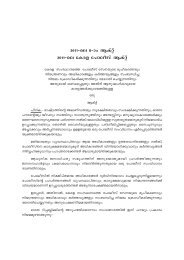Janamaithri Suraksha Project - Kerala Police
Janamaithri Suraksha Project - Kerala Police
Janamaithri Suraksha Project - Kerala Police
You also want an ePaper? Increase the reach of your titles
YUMPU automatically turns print PDFs into web optimized ePapers that Google loves.
COMMUNITY POLICING AS A PUBLIC POLICY:<br />
A STUDY OF ‘JANAMAITHRI SURAKSHA PROJECT’ OF KERALA POLICE<br />
Satyajit Mohanty, IPS<br />
1.1 Introduction<br />
Community policing as an alternative policing strategy revolves round the principle of proactive<br />
policing through people friendly policing practices, community participation and problem solving<br />
leading to crime prevention, maintenance of order and improvement in the overall quality of life in<br />
their neighbourhood. Community policing allows the law enforcement to get back to the principles<br />
upon which it was founded, to integrate itself into the fabric of the community so that the people and<br />
the police collaborate even before a serious problem arises. Here, police act as a catalyst in the<br />
social engineering experiment. To state succinctly, community policing is a useful holistic and proactive<br />
concept and a tool to transform the police image, strengthen the force and create attitudinal changes<br />
both within the force and among the public. In its strategic dimension, it contributes to the individual,<br />
state and national health and as such reduces social pathology. Community policing provides<br />
decentralized, personalized police service to the community. It recognizes that the police cannot<br />
impose order on the community from the outside, but that people must be encouraged to think of the<br />
police as a resource that they can use in helping to solve contemporary community concerns. It is<br />
not a tactic to be applied and then abandoned, but a new philosophy and organizational strategy that<br />
provides the flexibility to meet local needs and priorities as they change over time. To implement true<br />
community policing, police departments creates and develops a new breed of line officer who acts<br />
as a direct link between the police and the people in the community. The community policing officer’s<br />
broad role demands continuous, sustained contact with the law-abiding people in the community, so<br />
that together they can explore creative new solutions to local concerns, with private citizens serving<br />
as supporters and as volunteers. As the community’s ombudsman, the community policing officer<br />
also acts as a link to other public and private agencies that can help in a given situation. The benefits<br />
of community policing are broken down into three areas for the sake of brevity such as Communityspecific<br />
benefits, <strong>Police</strong>-specific benefits and Shared benefits. To be further specific communityspecific<br />
benefits include identification of and responding to community concerns, ownership of local<br />
problems, improved local physical and social environment and reduced fear of crime. <strong>Police</strong>-specific<br />
benefits include improved police–community relationship, better positive attitudes towards police<br />
and community perception of police ‘legitimacy’ and most importantly an increase in officer satisfaction<br />
with their work. The international and national best practices exhibit certain shared benefits such as<br />
a decreased potential for police–citizen conflict, a reduction in crime rates and a better flow of<br />
information between the police and community.<br />
Community policing is the need of the day and the police forces in the democracies around<br />
the world are realizing its utility and implementing community policing initiatives in varied forms. As<br />
an innovation in the police organisation and philosophy, community policing has come to centre<br />
stage. From United States to Britain, Brazil to South Africa, Singapore to Japan, countries adopt<br />
various forms of community policing with the core philosophy remaining universal. India inherited<br />
a colonial police force at the time of independence, whose mission and vision statement were<br />
drafted by the colonial rulers in the nineteenth century. The provisions of the old <strong>Police</strong> Act of 1861<br />
render itself redundant and archaic in a constitutional democracy where the authority of the people<br />
is supreme. However, despite absence of any provision in the Act, the State and in many instances<br />
the police leadership have embarked upon pro-active community oriented policing initiatives making<br />
the police sensitive to the need of the community. In the absence of institutional and legal framework<br />
many brilliant initiatives failed to stand the test of time. The community policing initiatives by most<br />
of the State and Union Territory governments were ‘informal policy processes’ that should have<br />
been backed by ‘due process’ policy. By saying ‘due process’ what is meant is that community<br />
policing practices should have been part of the police mission statement duly recognised in the Act<br />
and laws governing the police organisations. Off late, states like <strong>Kerala</strong>, Tamilnadu, Rajasthan etc.<br />
have encoded in their newly legislated state <strong>Police</strong> Acts the vision of community oriented policing.<br />
<strong>Kerala</strong> is one state that has launched its community policing scheme, ‘<strong>Janamaithri</strong> <strong>Suraksha</strong><br />
<strong>Project</strong>’, with required legal and institutional framework so that the initiatives survive the executive<br />
and political leadership as a public policy. The ‘<strong>Janamaithri</strong> <strong>Suraksha</strong> <strong>Project</strong>’, the flagship community<br />
policing scheme of <strong>Kerala</strong> <strong>Police</strong>, was conceptualized in the year 2005, when the UDF government<br />
was in power and launched in the year 2008 by the rival LDF government and now consolidated<br />
5

















